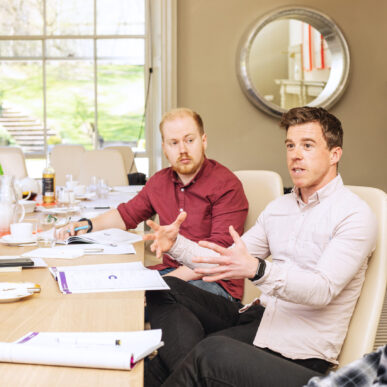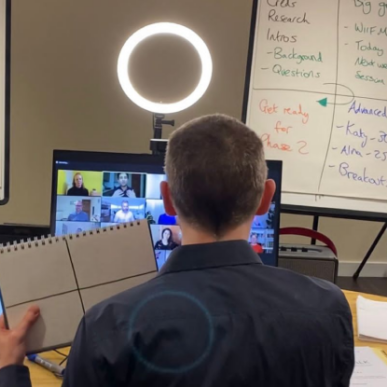‘Practice with purpose – replicate as much as you can in advance so nothing comes as a surprise.‘
Practice With Purpose: What England’s Penalty Shootouts Can Teach Us About Performing Under Pressure
If you’re a football fan, you’ll know the feeling that you get in the pit of your stomach when a game has gone through extra time and can only be won through a penalty shoot-out.
And if you’re an England fan, that feeling is particularly familiar. Historically, we’ve been notoriously bad at penalties. In fact, over the years, England have taken part in eight penalty shoot-outs across European Championships and World Cup games and lost six – that’s 75%.
Penalties traditionally strike fear in even the world’s best football players: when the stakes are high, the pressure to perform is even higher. When Gareth Southgate stepped up to take that fateful penalty in the semi-final against Germany in Euro 96, he already looked like a defeated man.
Speaking years later, he admitted that the visualisation of his own failure played a part in him missing the penalty that cost England the semi-final.
“My mind switched to the negative. “What if I miss?” That simple thought, which with better mental awareness could have been dismissed, was now nudging its way into my subconscious, and with hindsight, I know that was the tipping point of my failure.”
Southgate was puzzled even to be taking a penalty. He had never practiced taking them, and until that moment in the spotlight, he had only ever taken one before – which he’d missed. Little wonder that his confidence and self-belief were poor when walking up to the spot – and we all know what happened next.
A Trainable Skill
Fast forward twenty-five years and Southgate does not want his players to go through the same agony that he felt after England’s defeat at Euro 96 – so penalty training is now an essential part of the plan for his squad.
Whilst Southgate felt unprepared for the pressure of standing at the penalty spot; his players are doing everything possible to develop the confidence to perform, both physically and mentally. Under his leadership, England footballers are starting to overcome the negative mindset that has dogged them for decades and turn it into something positive.
How the England team prepares for penalties
Sportswriter Ben Lyttleton, author of ‘Twelve Yards: The Art and Psychology of the Perfect Penalty Kick’ believes that while you can never completely replicate the atmosphere and nerves of a real-life football game, you can nevertheless “practice with purpose” – that is, replicating as much as you can in advance so that nothing comes as a surprise.
Rather than just practising hitting the ball in the top corner of the net, Southgate’s players learn to overcome nerves and perform under pressure in three ways:
1) Training when tired
Penalty shootouts always come at the end of extra time when players are exhausted and stressed. To replicate this, the England squad practices penalties at the end of a gruelling 120-minute training session, when players’ legs are fatigued and their minds tired. By getting used to performing when they’re running on empty, players will be better equipped to deal with those physical feelings on the day.
2) Visualising ‘the walk’
Players often say that the walk from the centre circle to the penalty spot is the time when they feel most anxious and under pressure – so this is also something that they now practice. By getting used to that long walk before every penalty and visualising the feeling of success, players can learn to regulate their emotional state and equip themselves with the confidence to perform at their best.
3) Pausing for breath
It’s common for footballers to rush penalty kicks, and that often comes from nervous tension and a desire to get it over with.
But rushing penalties can be counter-productive: in France’s Euro 2020 game against Switzerland, Pogba waited six seconds before taking his penalty – and scored. Giroud waited three seconds – and scored. But Mbappe only waited 0.8 seconds, and his penalty was saved, knocking France out of the tournament.
Taking a pause gives players the chance to take a deep breath, collect their thoughts and focus on the job they’re there to do.
Though it’s early days, Southgate’s ‘practicing with purpose’ has been paying off. In the two penalty shoot-outs under his leadership up to Euro 2020, England went on to win both.
Overcoming performance anxiety
Performance anxiety doesn’t just come on the football field. You may have an important meeting, speech or presentation to deliver that brings out that same feeling of dread in the pit of your stomach. But just like the England team, preparing well, adopting a positive mindset and using visualisation techniques can help you to normalise the situation facing you and allow you to really perform at your best.
1) Rehearse out loud
Gareth Southgate had never practiced penalties before Euro 96 – and it didn’t go well. So, if you have a presentation to deliver, practice saying it out loud. If you’re going to be standing up, practice doing that too. Get your body and mind used to how it’s going to feel on the day so that it will feel much more familiar when you do it for real.
2) Visualise success
Think about what it’s going to take for you to get the perfect result. What does success look like? Walk through the event in your mind from start to finish and imagine what it will be like to feel confident, calm and in control.
If you can, practice walking up to the stage or the front of the room, imagining the crowd there waiting for you and listening to you. Visualise yourself delivering an engaging and successful presentation. By normalising the situation in your mind, you’ll feel much more confident, and you’re less likely to be put off by unexpected surprises or negative emotions slipping in.
3) Pause
We’ve written before about the power of the pause. When you’re feeling the pressure, pausing to take a breath can help you calm any panicky nerves and give you back the control you need. Don’t worry about keeping the audience waiting; it’s better to go at your own pace and remember that you are prepared and ready.
Remember that there will always be situations in which you feel nervous or anxious about your performance, but by practising, adopting a positive mindset and using visualisation techniques, you too can feel confident when stepping up to the mark.
To learn more about how we can help you, please get in touch with our team and discover how our courses can help to increase the impact of your presentations.
Written by Jennifer Bartram




















